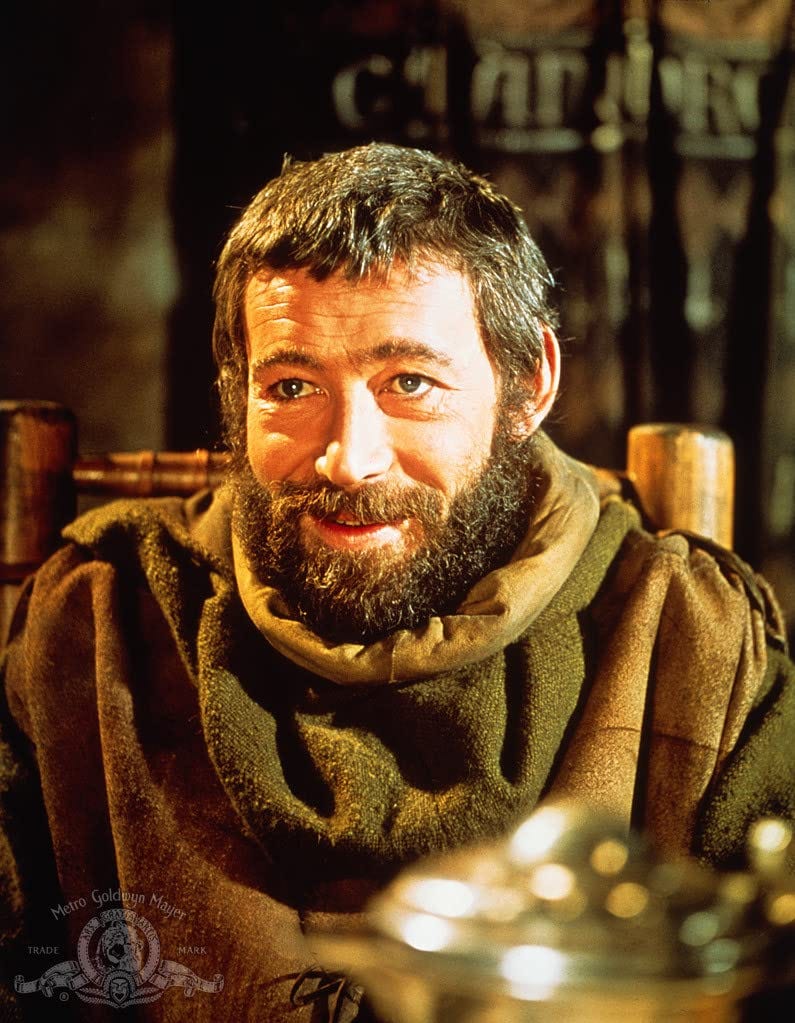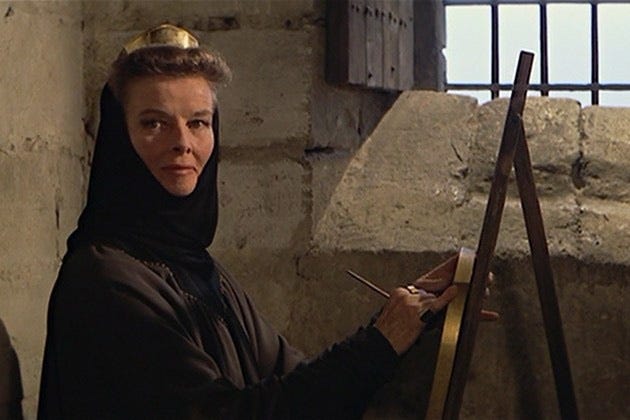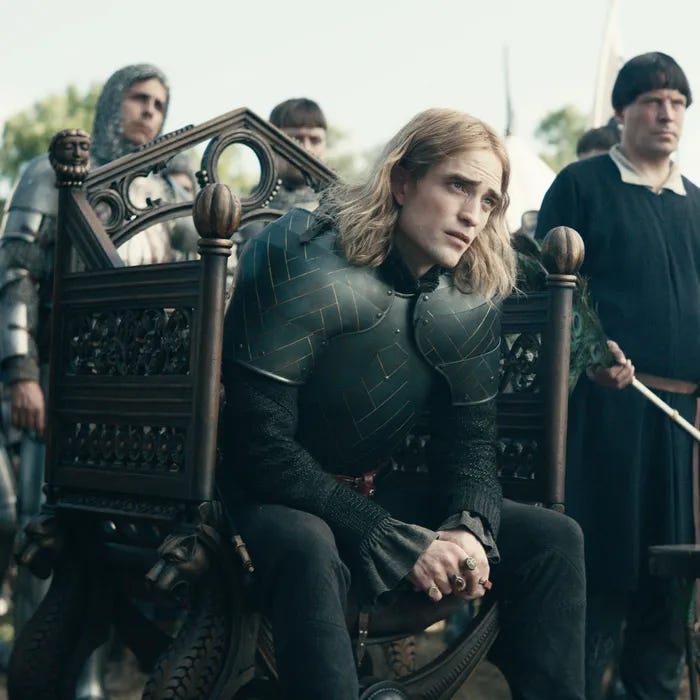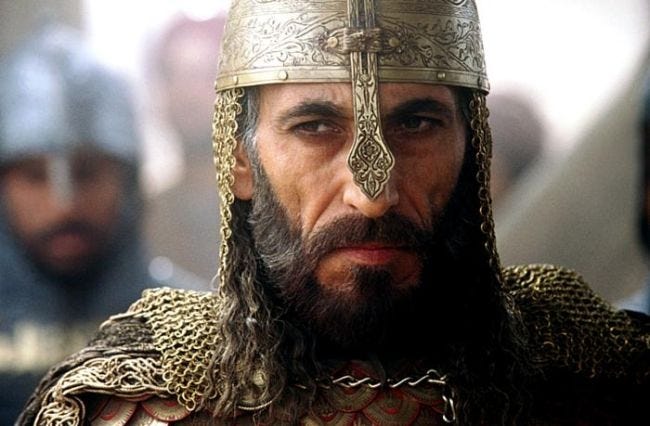There are certain historical characters whose life, if written as fiction, would beggar belief. King Harald Hardrada of Norway, aka The Last Viking, and improbably a Crusader himself, comes to mind. Richard had one of those lives, and the cast of characters around him were a huge part of that. I thought it would be fun to catalog them, and give them an actor or model to help us visualize.
The above song, appropriately enough, was written by one of the characters in Richard’s life, Jean de Nesle, otherwise known as Blondel. Blondel was a troubadour, and legend has it that while Richard was held prisoner for ransom by the Emperor Henry VI, Blondel went from castle to castle, singing Richard’s favorite song, and found Richard when Richard replied by singing the second verse from inside the castle.
May I present the cast?
Richard I (the Lionheart) (1157 - 1199)
Of Richard we have said a lot and will say more later. For now, we’ll stick with his appearance. Richard de Templo, a contemporary historian we discussed in episode 2, says:
He was tall, of elegant build; the colour of his hair was between red and gold; his limbs were supple and straight. He had long arms suited to wielding a sword. His long legs matched the rest of his body.
King Henry II, his father (1133 - 1189)
Henry II, also known as Henry Curtmantle, Henry FitzEmpress, Henry Plantegenet, was the first Plantegenet King and founder of the so-called Angevin Empire. Good looking, red haired, short and stocky. Famously high energy, smart, ruthless when he needed to be. A Norman, he spoke French and Latin primarily, even as ‘King of England’ (remember that England was essentially ruled by the Normans from France since William the Conqueror in 1066).
King Louis VII of France made him Duke of Normandy after his father died. At Henry’s death he controlled England, large parts of Wales, half of Ireland and the western half of what is today France.
In 1152 he married Eleanor of Aquitaine, the ex-wife of Louis VII. They had eight children: five sons (William IX Count of Portiers, Henry (the ‘Young King’), Richard I the Lionheart, Geoffrey II Duke of Brittany, King John) and three daughters (Matilda Duchess of Saxony, Eleanor of Castile, Joan Queen of Sicily). The family was famously and not entirely accurately portrayed in The Lion in Winter, with Henry played by Peter O’Toole. Three of Henry’s sons would be King. The family was wildly dysfunctional. There were multiple rebellions by his sons in an attempt to wrest control from him (1173 led by the Young King, with Richard, Geoffrey and Eleanor joining; 1183 led by the Young King and Geoffrey, after which the Young King dies from fever; and 1189, led by Richard).
King Philip Augustus of France was pivotal in many of these rebellions against Henry and allied strongly with Richard in the last rebellion, after which Henry died from illness. Richard would become King, and while Philip was instrumental in this, and was nominally Richard’s liege lord for Normandy, they would go on to become mortal enemies.
"Will no one rid me of this turbulent priest?"
Thomas Becket was appointed Archbishop of Canterbury by Henry. After a series of conflicts, Henry is said to have uttered the famous line, ‘Will no one rid me of this turbulent priest’? Four knights then proceeded to Canterbury Cathedral and killed Becket. The resulting controversy hamstrung Henry’s rule until his public penance. The episode was captured in T.S. Eliot’s play, Murder in the Cathedral.
After the last rebellion, during which Henry was ill, he collapsed into fever and died in 1189.
Eleanor of Aquitaine, his mother (1122 - 1189)
Eleanor of Aquitaine was Queen of France from 1137 to 1152 as the wife of King Louis VII, Queen of England from 1154 to 1189 (as the wife of King Henry II), and Duchess of Aquitaine in her own right from 1137 until her death in 1204. Eleanor was one of the most powerful figures and influential figures of the Middle Ages, ruling large portions of England and France through direct right or proxy.
As well as her eight children with Henry, Eleanor had two daughters with Louis, Marie and Alix. After Eleanor married Henry, Louis would go to war with Henry, even after having made him Duke of Normandy. Her father William X is widely regarded as the first Troubadour.
Active, vivacious, beautiful and intelligent, Eleanor was a bad match for the ascetic Louis; she’s quoted as saying: “I thought I married a king, instead I married a monk!”. She was often rumored to have engaged in extra-marital affairs. Extremely energetic, she crossed the Alps at 69 years old with Richard’s betrothed Berengaria. She was a match for the strong willed Henry, and their marriage was apparently marked by long periods of love and long periods of strife. In later years, Henry imprisoned Eleanor in Aquitaine for rebelling against him, where Richard was as well. She was heavily involved in Richard’s upbringing, and he is generally thought to be her favorite child.
King Philip Augustus of France, Philip II (1165 – 1223)
(* I wanted Adam Driver but he was too expensive.)
Philip II, King of France. Eight years younger than Richard, Philip became King in 1180 when his father Louis suffered a stroke and transferred power. He would spend much of his life battling Henry II or one of his sons, often allying himself with one of them (e.g. Richard) to attack the others. Philip would put an end to the Angevin Empire by defeating the Holy Roman Emperor Otto IV and his allies (including the by-then King John) at the Battle of Bouvines in 1214, and John’s resulting weakness would lead to the creation of the Magna Carta in England. Less a warrior and more a politician, Philip was a cunning and dangerous opponent who excelled at fomenting trouble amongst allies. He would be Richard’s nemesis for much of Richard’s life.
The only known description of Philip describes him as "a handsome, strapping fellow, bald (from his illness at Acre) but with a cheerful face of ruddy complexion, and a temperament much inclined towards good-living, wine, and women. He was generous to his friends, stingy towards those who displeased him, well-versed in the art of stratagem, orthodox in belief, prudent and stubborn in his resolves. He made judgements with great speed and exactitude. Fortune's favorite, fearful for his life, easily excited and easily placated, he was very tough with powerful men who resisted him, and took pleasure in provoking discord among them. Never, however, did he cause an adversary to die in prison. He liked to employ humble men, to be the subduer of the proud, the defender of the Church, and feeder of the poor".1
Saladin (Ṣalāḥ al-Dīn, or Yusuf ibn Ayyub ibn Shadi) (1137/38 - 1193)
Saladin is perhaps the most famous of Muslin heroes of the Middle Ages, or perhaps ever). Born a Kurd, his family moved to Aleppo and eventually Saladin entered a military career. At the age of 31, in 1169, Saladin was appointed commander of the Syrian troops in Egypt and Vizier of Egypt, receiving the title of King (malik) but usually referred to as Sultan. He oversaw the transition of Egypt from Shia to Sunni Islam, and moved to unite Egypt, Syria, Mesopotamia and Palestine under his rule. He had a reputation as a generous, virtuous, and serious ruler.
In 1187 he and his army defeated the primary Crusader army of 20,000 at the Battle of Hattin, capturing an important relic, a piece of the True Cross, and then recaptured Jerusalem. Only a small number of Crusaders escaped. They were led by Guy de Lusignan, the King of Jersualem (and for that matter a vassal of Richard through his holdings in Aquitaine). After the battle Saladin spared Guy’s life (he is quoted as saying, “Kings do not kill Kings”), but personally executed Reginald of Chatillion, and ordered the execution of all but one of the surviving captured Knights Templar and Knights Hospitallers.
This was devastating news for Europe and sparked the Third Crusade, with Richard as one of its leaders. Richard and Saladin would fight throughout the entire Third Crusade. Their contest was marked by a strange mutual respect, and they engaged both spirited military battles as well as a variety of diplomatic cat-and-mouse games. Saladin even once sent a casket of ice from the mountains to Richard when he was sick with fever.
OK, Substack says I’m running out of space for this post. I’ll move on to the rest of the cast in the next installment!
Do you have your own ideas for the ideal cast for a movie about Richard? Leave ideas in the comments - maybe you’ll change my mind!
https://en.wikipedia.org/wiki/Philip_II_of_France







